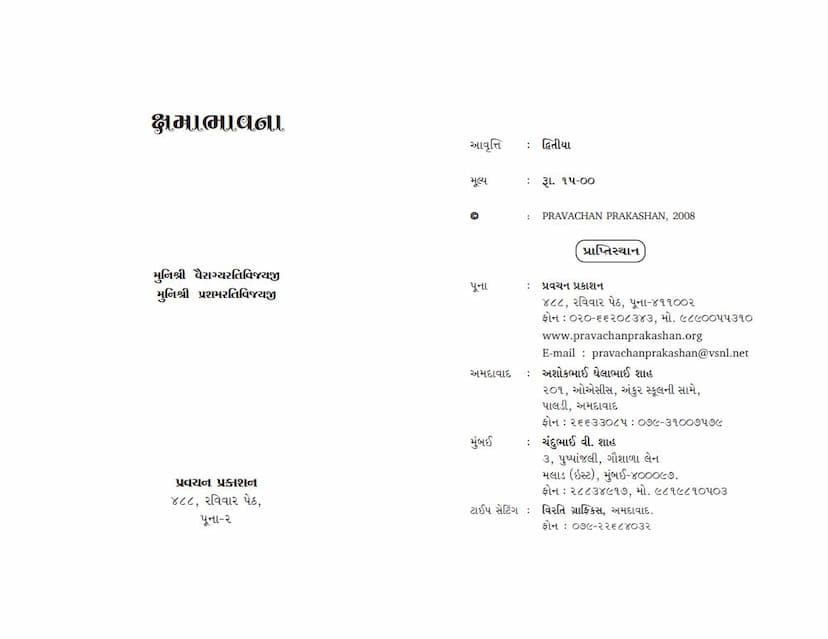Kshamabhavna
Added to library: September 2, 2025

Summary
Here's a comprehensive summary of the Jain text "Kshamabhavna" by Vairagyarativijay and Prashamrativijay, based on the provided pages:
Book Title: Kshamabhavna (Meaning: The Essence/Nature of Forgiveness) Author(s): Muni Shri Vairagyarativijayji, Muni Shri Prashamrativijayji Publisher: Pravachan Prakashan, Pune
Core Theme and Purpose:
"Kshamabhavna" emphasizes the profound importance of forgiveness (Kshama) within the framework of Jain spiritual practice, particularly in relation to the annual observance of Samvatsari. The book argues that true spiritual progress and inner purification are not possible without cultivating genuine forgiveness, both towards oneself and others. It aims to move beyond the mere ritualistic performance of forgiveness towards a deep-seated, heartfelt practice.
Key Concepts and Arguments:
- Samvatsari as a Day of Sadhana: The book highlights that Samvatsari is not just a ritualistic day but a crucial opportunity for self-introspection and life review. It's a time to examine one's inner state and relationships, correcting any flaws in emotions and conduct.
- The Superficiality of Modern Practices: The text criticizes the trend of treating Samvatsari and forgiveness as mere social formalities, akin to sending greeting cards or New Year wishes. It notes that sending "Michchhami Dukkadam" cards to those one may never meet misses the real essence of seeking and offering forgiveness to those we interact with daily.
- True Forgiveness vs. Ritual: Genuine forgiveness is defined as a state where there is no residual anger, complaint, hatred, or malice towards anyone. It's about cleaning up any bitterness or shortcomings in our emotions and relationships.
- The Threefold Aspect of Forgiveness: The book outlines three essential dimensions of forgiveness:
- Forgiveness of "Para" (Others): This involves seeking forgiveness from everyone around us.
- Forgiveness of "Parmatma" (The Supreme Being/God): This includes apologizing for any offenses committed against the divine or the teachings of the Tirthankaras.
- Forgiveness of "Jat" (Self): This is the crucial act of forgiving oneself for straying from one's true, pure nature due to attachment and aversion (kashayas).
- The Danger of Retaining Anger (Kashayas): A significant warning is issued: retaining anger or animosity for more than a year can nullify spiritual practices and even lead to a loss of faith (samkit). Even for monks, holding onto grudges for extended periods can be detrimental to their spiritual path.
- The Practice of Forgiveness within Family and Society: A substantial portion of the book is dedicated to illustrating how forgiveness should be practiced within various relationships:
- Parent-Child: Parents are urged to apologize to their children for any injustices, favoritism, or lack of love shown. Children are also encouraged to seek forgiveness from parents for disrespect or neglect.
- Spouse (Husband-Wife): Husbands are advised to seek forgiveness from their wives for mistreatment, disrespect, or insensitivity. Wives are also encouraged to apologize for their faults, such as back-answering, lying, or creating discord.
- Siblings (Brother-Sister): The book emphasizes the need for older siblings to seek forgiveness from younger ones for any acts of dominance or neglect, and vice-versa for any disrespect or causing distress.
- In-laws (Mother-in-law/Daughter-in-law, Father-in-law/Daughter-in-law): The text addresses the common friction between mothers-in-law and daughters-in-law, urging both to let go of pride and ego and seek forgiveness. Fathers-in-law are also encouraged to be supportive of their daughters-in-law and apologize for any mistreatment.
- Children: Even apologizing to very young children is advocated for, as it instills the value of humility and respect from an early age.
- Servants/Employees: The book highlights the importance of treating domestic staff with respect and seeking forgiveness for any harsh words, unfair treatment, or lack of support.
- Friends and Acquaintances: Forgiveness is also extended to friends and acquaintances for conflicts, gossip, backbiting, and other social transgressions.
- Society and Religious Community: The authors stress the need to apologize for causing disturbances in society, disrupting order, or disrespecting fellow religious practitioners and the principles of Jainism.
- Forgiveness Towards the Divine and Gurus: The book also includes seeking forgiveness from God (Parmatma) for neglect of religious duties or disrespect shown in temples, and from spiritual preceptors (Gurudevs) for failing to live up to their teachings or providing inadequate support.
- Self-Forgiveness: This is presented as a critical aspect. It involves acknowledging and forgiving oneself for succumbing to negative emotions (kashayas), suppressing one's inner voice, and engaging in actions that go against one's moral compass.
- The Underlying Cause of Conflict: The text points out that much conflict stems from ego, possessiveness, and the desire to prove oneself right while proving the other wrong. It advises shedding these tendencies.
- The "I Ask for Forgiveness" Section: This section, attributed to Muni Shri Prashamrativijayji, provides a personal, heartfelt plea for forgiveness. It expresses a desire to offer forgiveness not just on Samvatsari but throughout the year, recognizing forgiveness as the lifeblood of existence. It delves into the personal struggle of recognizing one's own faults, the tendency to blame others, and the deep-seated emotions that fuel conflict. The author reflects on how anger often stems from love and concern, and the importance of letting go of the need to be right.
Overall Message:
"Kshamabhavna" serves as a powerful guide for spiritual practitioners to understand and internalize the true meaning of forgiveness. It emphasizes that forgiveness is not a sign of weakness but a profound strength that purifies the mind, heals relationships, and is essential for spiritual liberation. The book encourages a proactive approach to seeking and offering forgiveness, integrating it into daily life, and making it the foundation for a truly meaningful spiritual journey.